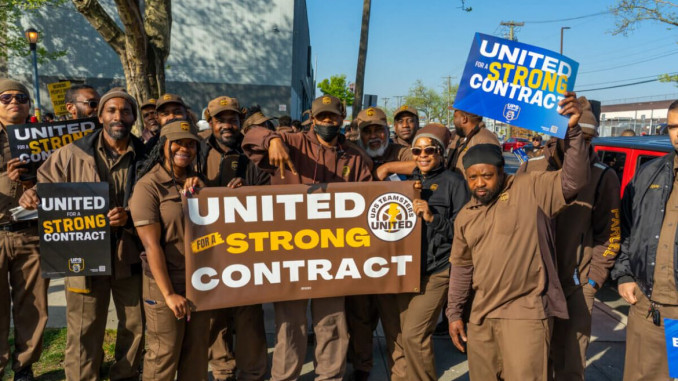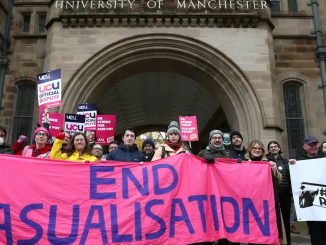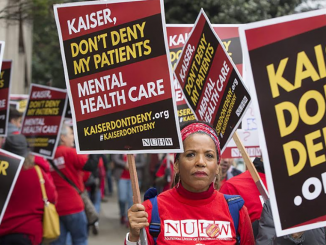
In the past month, we have seen glimpses of workers showing their power in the shipping and delivery sectors, and there could be more to come. Frustrated after working without a contract for almost a year, dockworkers in the International Longshore and Warehouse Union (ILWU) temporarily shut down major ports along the West Coast in early June. They did this through actions such as calling off sick to disrupt port operations.
Shortly after this, ILWU dockworkers in British Columbia, Canada voted overwhelmingly to go on strike. Among several demands, they are calling for greater wage increases to keep up with inflation. They have been on strike since July 1st and are disrupting the flow of $500 million dollars’ worth of trade coming in and out of the country each day.
Besides these dockworker actions, there are important contract negotiations going on right now at United Parcel Service (UPS). The contract for UPS workers organized in the International Brotherhood of Teamsters union expires on July 31st. The Teamsters union represents about 340,000 workers at UPS, making it the largest unionized workforce in a single company in the U.S. At this point, both the Teamsters and UPS say negotiations have broken down around several points of disagreement, such as wages. It is unclear if a strike will happen, or if an agreement will be reached before the deadline.
Dockworkers and delivery workers, such as those at UPS, play a vital role in the functioning of everyday society. Entire industries could not function without their work. In transit, the shipment of parts gets broken-down busses and trains back in operation. Healthcare workers rely on the regular delivery of medical supplies to take care of patients. Not a single industry exists isolated on its own – all depend on the labor of those involved in the transportation of goods from around the world.
If you work at almost any job, you know that any interruption to the supply chain can mean huge disruptions at work. Sometimes delayed shipments mean you can’t even do your job. If dockworkers or UPS workers stop work for even just a few days, it sends shockwaves throughout all of society.
The global shipping and delivery industry moves trillions of dollars’ worth of goods annually and is extremely profitable for the companies that dominate the sector. Because of this, the politicians and bosses they serve know they must control workers in these industries in order to maintain their power and profits.
So when dockworkers briefly shut down West Coast ports last month, Biden’s Labor Secretary immediately flew to California and mediated a pro-company tentative agreement to get the ports running again. In Canada, the government has also stepped in to mediate negotiations while other Canadian politicians are calling on their Parliament to pass a “back to work” law to forcibly end the strike.
A similar thing happened here in the U.S. last December when rail workers almost went on strike to win better working conditions and wage increases. The Biden administration and Congress worked together to impose a contract on them, even though the majority of workers had voted to reject it.
These reactions point to the important and indispensable role these workers play in our society. It also shows how governments respond when workers start to demonstrate their power – they immediately try to suppress them.
The bosses and their politicians see the potential power of an organized workforce, which is why they make so many efforts to shut workers up and prevent them from expressing this power. But if we take one lesson from this, it’s that we are completely essential to the functioning of their economy. They fear us knowing our own strength – which is all the more reason for us to wield it.
After all, it is our work that makes the world go round. We ought to decide how resources and the fruits of our labor are used, not the bosses and politicians running the world at our expense. So if transport or delivery workers decide to continue their fights, we must see their struggle as our own.




